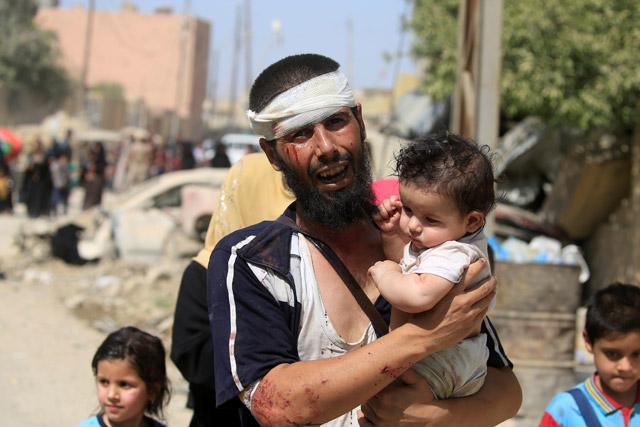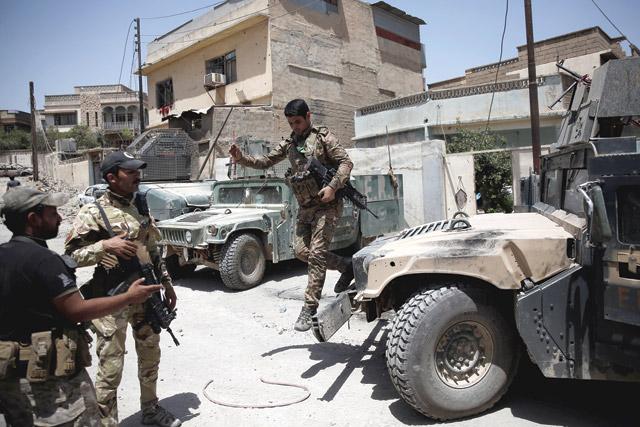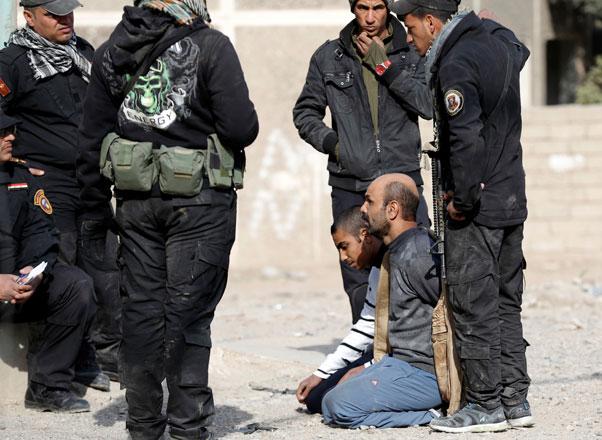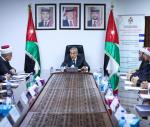You are here
Iraqi Shiite paramilitaries take Baaj town west of Mosul from Daesh — army
By Reuters - Jun 05,2017 - Last updated at Jun 05,2017

A wounded displaced Iraqi man who fled from clashes carries his child in western Mosul, Iraq, on Saturday (Reuters photo)
BAGHDAD — Shiite paramilitaries have captured the Iraqi town of Baaj from the Daesh terror group, further shrinking the northern region under extremist control as part of a US-backed campaign to retake the city of Mosul, the Iraqi military said on Sunday.
Eight months into the Mosul offensive, Daesh militants have been dislodged from all of the city except an enclave along the western bank of the Tigris River.
Daesh’s grip on the Iraqi side of the northern region along the border with Syria, a desert area where Iraqi and US sources believe Daesh leader Abu Bakr Al Baghdadi is hiding, has been ebbing as forces fighting on the side of Iraq’s government have advanced.
The Iraqi air force provided cover for the thrust into Baaj of the Shiite paramilitaries known as Popular Mobilisation, said a statement from the Iraqi joint operations command.
Popular Mobilisation is steered by neighbouring Shiite regional power Iran, an adversary of the United States, but is playing a part in the campaign to defeat Daesh, an enemy of both, in Mosul and the surrounding province of Nineveh.
Iraqi government armed forces are focusing their effort on dislodging insurgents from remaining pockets in Mosul, Daesh’s de facto capital in Iraq, since 2014.
While reporting nominally to Iraq’s Shiite-led government, Popular Mobilisation has Iranian military advisers, one of whom died last month fighting near Baaj.
Securing border territory between Iraq and Syria is important for Iran to reopen a land route to supply Syrian President Bashar Assad’s army with weapons in his protracted war with rebels and militants.
A statement published by Popular Mobilisation announcing the capture of Baaj came from Abu Mahdi Al Muhandis, a prominent leader of the paramilitary with longstanding ties to Iran.
Iran has helped to train and organise thousands of Shiite militiamen from Iraq, Afghanistan and Pakistan in Syria’s war. Fighters from Lebanon’s Shiite Hizbollah are also working closely with Iranian military commanders in Syria.
Daesh is still in control of a desert stretch alongside the border south of Baaj, including the crossing of Al Qaim which connects its territory in Iraq and Syria.
US and Iraqi officials believe Daesh leader Baghdadi has left operational commanders behind with diehard followers to fight on in Mosul and is now focusing on his own survival.
The fall of Mosul would, in effect, mark the end of the Iraqi half of the self-styled “caliphate” declared in 2014 by Baghdadi from the pulpit of one of its old mosques.
But it would still control two smaller Iraqi urban centres: Tal Afar, a city populated by ethnic Turkmen west of Mosul, and Hawija, a pocket between Mosul and Baghdad, the Iraqi capital 400km to the south.
Related Articles
BAGHDAD — A senior commander of Iran's Islamic Revolutionary Guards Corps (IRGC) was killed fighting Daesh west of the Iraqi city of Mosul,
BAGHDAD — Iraq's Iran-backed Shiite paramilitary force said on Sunday it had dislodged the Daesh terror group from a number of villages west
MOSUL — Iraq's sectarian political leaders have plunged back into a dispute over the status of Shiite armed groups, undermining efforts to r

















